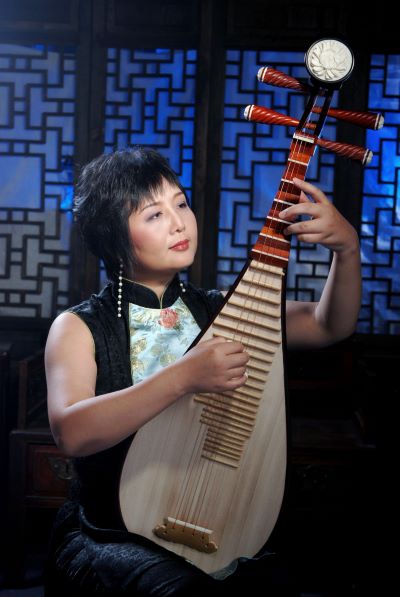Gao Hong’s Commitment to Music, Teaching, and Diversity
Written by Masyn Rykhus
Gao Hong grew up during the People’s Republic of China’s Cultural Revolution, when students like her were being sent to the countryside to work in the fields. But Gao’s mother, a music teacher, pressed Gao to play an instrument to open a different path for her. “I picked the pipa because it was the most challenging instrument to play,” Gao said, adding with a smile, “Because it was so challenging, it also had less competition!”

The pipa is a traditional Chinese lute shaped like a pear. The sound can be bright and clear, or gentle and mellow. Gao recently showcased its versatility by playing a pan-Asian concert in April where she was joined by musicians playing traditional instruments from Japan, Vietnam, Syria and Venezuela.
Considered a child prodigy, Gao started playing professionally at age 12, touring and living with a song and dance troupe in China. Reflecting back, she says, “I missed my family. I cried every night before sleeping. But I became a stronger person and gained independence because I didn’t have anyone to do things for me.”
When asked if she always had a passion for the music she’s become famous for around the globe, Gao concedes, “I don’t have the answer they’re looking for. I don’t say that music was always my passion and I loved it so much. In fact, it was the opposite. My mom forced me into playing eight hours a day, and I didn’t like it.”
Music and the pipa, fortunately, grew on her. “I did music because I had to. I took on the mindset of loving what you do, instead of doing what you love. Now no one can take the pipa away from me because it’s my blood and it's my life.”
Today, Gao feels almost as if she is living her younger years that she never got to experience, as she shares her students’ enthusiasm for the pipa. A professor at Carleton College since 2001, she has spent the last 22 years expanding the college’s music program.
Her first teaching experience in America was 29 years ago. She visited a small elementary school in Cambridge, Minnesota with about 90 students. Despite her broken English at the time, she played her pipa and introduced traditional Chinese music to the students. After her performance, she received 89 letters from the students expressing their gratitude for her visit. One student even said that she wanted to grow up and play the pipa just like her. “From then on, I knew teaching was my duty,” Gao shared.
Music on a Global Scale
Gao has had a large influence on the introduction of Chinese music in the United States. She even wrote the first method book for the pipa in the English language.
“When I first came to the United States, no one even knew what the pipa was. They thought it was a vegetable!”
To Gao, incorporating diversity and other cultures is an essential part of music. Whether playing with a rock and roll artist or a Venezuelan harpist, she finds music is an easy way to tell a story and get others to listen. Gao believes that music is the universal language because everyone can interpret the emotions being expressed.
Among the credentials she’s amassed, in 2019 Gao was the first musician in any style to receive five McKnight Artists Fellowships for Performing Musicians. She also was awarded a guest professorship at the Central Conservatory of Music in Beijing.
By playing with other musicians from other cultures, Gao has picked up on new musical techniques. For example, she has discovered new rhythms from African music and learned about the different musical scales in Arabic music.
When asked what she predicts the role of Chinese music will be in the future, Gao says she hopes that through music, more people will be open to understanding Chinese culture. Her recent 17-day spring tour took her to universities and colleges throughout New England and northern Minnesota.
“Music brings people and cultures together. Music has no boundaries; it’s about making harmony. It opens many minds.”
